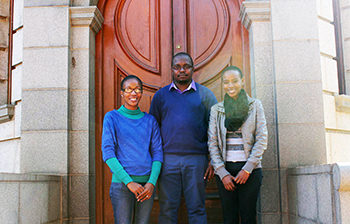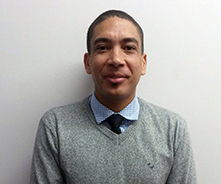Latest News Archive
Please select Category, Year, and then Month to display items
21 November 2024
|
Story Jacky Tshokwe
|
Photo Supplied
 Prof Mogomme Masoga, Dean: Faculty of the Humanities.
Prof Mogomme Masoga, Dean: Faculty of the Humanities.
On 8 November 2024, the South African Humanities Deans Association (SAHUDA) elected Prof Mogomme Masoga, Dean of the Faculty of The Humanities at the University of the Free State (UFS), as its new President. This appointment marks a pivotal moment for SAHUDA, which represents a diverse network of deans who champion the prominence and future of humanities, social sciences, and the arts in South Africa and beyond. Prof Masoga, who has served as Vice-President of SAHUDA for the past year, brings a wealth of experience and a deep commitment to advocating for the role of humanities in addressing the challenges of our contemporary world.
As President, Prof Masoga envisions broadening the influence of what he terms ‘public and applied humanities.’ His aim is to advance a humanities framework that not only enriches academic discourse, but also engages with critical global and local issues. This approach, rooted in socially responsive scholarship, will prioritise areas such as computational and digital humanities, environmental humanities, and other interdisciplinary fields that intersect with the pressing concerns of our time.
“The humanities are more relevant than ever to understanding complex societal issues,” Prof Masoga explained. “Through public and applied humanities, we can bring the critical perspectives of our field into active dialogue with the challenges of a digital and ecologically threatened world.”
His election underscores the University of the Free State's growing influence in national and international conversations about the future of the humanities. For the UFS, this leadership role enhances its reputation as an institution deeply invested in fostering meaningful contributions to society. Prof Masoga’s presidency is set to amplify the university’s voice and perspectives in SAHUDA’s mission to fortify the role of humanities in education and public life.
Over the next two years, Prof Masoga’s tenure will include a focus on initiatives that strengthen the relevance of humanities scholarship, encourage interdisciplinary research, and cultivate public engagement. He will also prioritise fostering collaboration across higher education institutions in South Africa and internationally to ensure that humanities disciplines are equipped to address the diverse needs of our rapidly evolving world.
Prof Masoga’s commitment to SAHUDA’s mission reflects the values and aspirations of the UFS Faculty of The Humanities. His presidency is an invaluable opportunity for the university to contribute to the national agenda of reinforcing the humanities as a field essential to a healthy, critically informed, and culturally aware society. This achievement serves as a proud moment for the UFS and a beacon for the potential of the humanities to drive societal progress in South Africa and beyond.
nGAP lecturers welcomed by the UFS academic community
2016-06-30

University of the Free State’s newly-appointed nGAP
lecturers. From the left, Neo Mathinya,
Phumudzo Tharaga, and Kelebogile Boleu.
The University of the Free State (UFS) was allocated six positions as part of the Department of Higher Education and Training (DHET) New Generation of Academics Programme (nGAP). Four candidates have filled positions in the Faculty of Health Sciences, Faculty of the Humanities and the Faculty of Natural and Agricultural Sciences – with two positions still vacant.
According to Minister of Higher Education and Training, Dr Blade Nzimande, nGAP is part of the Staffing South Africa's Universities Framework, which focuses on the expansion of the size and compilation of academic staff at South African universities, especially with regard to transformation. The focus of the programme is the appointment of black and coloured candidates as well as women.
The Department of Soil, Crop, and Climate Sciences in the Faculty of Natural and Agricultural Sciences welcomed two nGAP lecturers, Phumudzo Tharaga and Neo Mathinya. The Faculty was allocated four positions. Two positions are filled, while two positions in the Department of Animal and Wildlife Sciences are almost ready to be filled with exceptional candidates.
Agrometeorologist with his feet on the ground
Phumudzo Tharaga holds an MSc from the UFS, and is currently pursuing a PhD. Tharaga’s research focuses on quantifying the water use efficiency of sweet cherry orchards under different climate conditions in the Eastern Free State. Tharaga will offer his students a wealth of practical experience, which he began accumulating while working at ABSA as an agro-meteorologist, before moving on to become a senior scientist at the South African Weather Service. In 2015, Tharaga became a research technologist at the Council for Scientific and Industrial Research (CSIR) and then returned to the UFS as an nGAP candidate at the beginning of 2016.

Beynon Abrahams, nGap lecturer
at the Faculty of Heath Sciences
Department of Basic medicine
Motivated scholar turned academic
Neo Mathinya, who hails from Taung in the North West, has made the UFS her home. She received both her undergraduate and honours degrees from the university. Apart from joining the department as a lecturer under the nGAP initiative, she is currently studying for her MSc in Soil Physics. She will continue with this research when she comes to her PhD. Mathinya’s research focuses on soil salinity - the process of increasing salt content - which affects the ability of plants to take up water, a process, known as osmotic stress. She will investigate the effects of irrigation water salinity on the grain yield and quality of malt barley.
Researcher with a passion for crime prevention
Kelebogile Boleu joined the Department of Criminology in the Faculty of Humanities, with a fresh take on diversion and crime prevention. Boleu holds a BA Criminology (Hons) and is now pursuing her Master’s degree. She worked for NICRO a non-profit organisation specialising in social crime prevention and offender reintegration, with programmes that prevent young and first-time offenders from re-offending, thus reducing crime. Boleu said that her practical experience makes her lectures to third-year criminology students exciting. Boleu’s research focuses on analysing the value of pre-sentencing reports in assisting adjudicators to make well-balanced judgments in cases.
Research with a winning plan for fight against breast cancer
Beynon Abrahams joined the Department of Basic Medical Sciences in the Faculty of Health Sciences. Abrahams holds a BSc, BSc (Hons), and MSc in Medical Biosciences from the University of the Western Cape. Abrahams’ Master’s research focused on breast cancer, research on which he is building in his PhD. This doctoral research involves the exploration of P-glycoprotein, a protein expressed on cancer cell and responsible for multi-drug resistance in cancer treatment. The aim of this research is to develop a therapeutic drug treatment strategy that will improve breast cancer patient survival outcomes. Abrahams’s greater vision is to look at conventional cancer therapeutic regimens, to find ways in which they can be improved.
The nGAP initiative offers these young lecturers an opportunity for growth and development as academics, while providing them with opportunities they would have not have been exposed to otherwise.